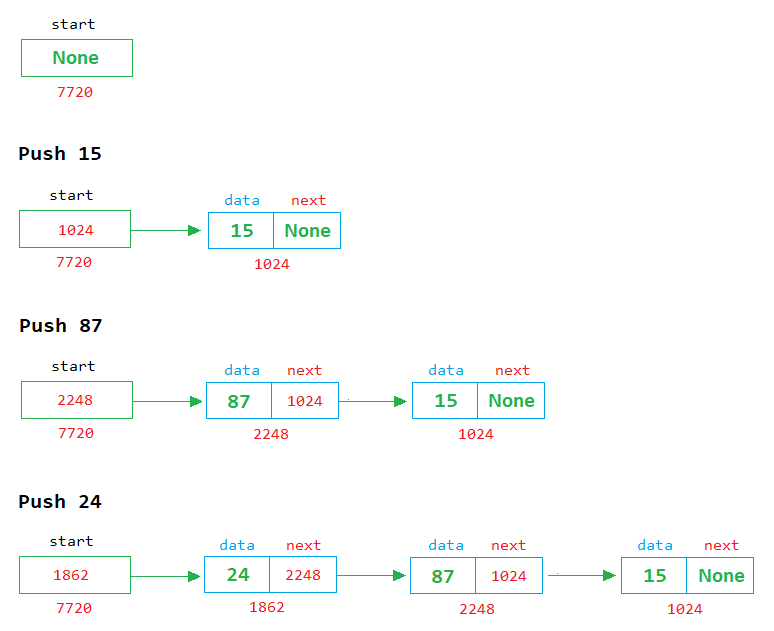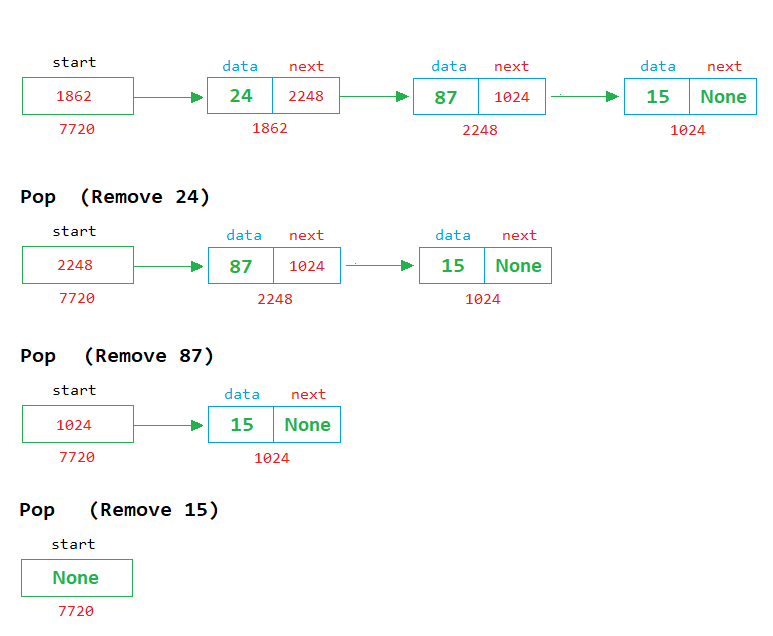Stack using Linked List in Python
User-Defined Data Structures in Python
In this lesson, we will learn how to implement the stack using a singly linked list in python.
Linked List Implementation of Stack in Python
We know about the stack and how to implement it using an array. In this lesson, we will learn how to implement the stack using a singly linked list.
We also know that two operations on the stack are possible: push and pop. See the image below to understand how to implement push and pop operations on a stack using a linked list.
Push Example

In the above image, we can see that when a new node is created, it is placed in front of the first node, and its address is stored in the start variable.
Pop Example

In the above image, we can see that each time a node is removed, the first node is deleted from the list, and the address of the next node is stored in the start variable.
Program of Stack using Linked List
Below is the complete program of stack in python using singly linked list having size 5.
Example
import os
# define node class
class Node:
def __init__(self):
self.data = 0
self.next = None
start = None
temp = None
size = 5
top = 0
ch = None
n = None
while 1:
os.system('cls')
print('1. Push')
print('2. Pop')
print('3. Display')
print('4. Exit')
ch=int(input('Enter your choice '))
if ch==1: # for push operation
if top==size:
print('Stack is full')
input('Press enter to continue...') # Pause the loop so that the user can see the message
else:
# Enter a number to store in node
n=int(input('Enter a number '))
# create a node object in temp
temp = Node()
temp.data = n # assign the value of n in the data part of temp
temp.next = None # assign the None in the next part of temp
if start == None: # if start in None
start = temp # then assing the temp in start (start points to the first node in the memory)
else:
# insert the new node before the first node
temp.next=start;
start=temp;
top=top+1
elif ch==2: # for pop operation
if start==None:
print('Stack is empty')
input('Press enter to continue...') # Pause the loop so that the user can see the message
else:
print('Number Popped = %d' %(start.data))
temp=start
start=start.next
del(temp)
top=top-1
input('Press enter to continue...') # Pause the loop so that the user can see the message
elif ch==3: # for display operation
if start==None:
print('Stack is empty')
input('Press enter to continue...') # Pause the loop so that the user can see the message
else:
temp=start # start from 1st node
# display the nodes on the screen
while temp is not None:
print('%d' %(temp.data))
temp=temp.next
input('Press enter to continue...') # Pause the loop so that the user can see the stack
elif ch==4:
exit(0)
else:
print('Wrong Choice')
input('Press enter to continue...') # Pause the loop so that the user can see the message


